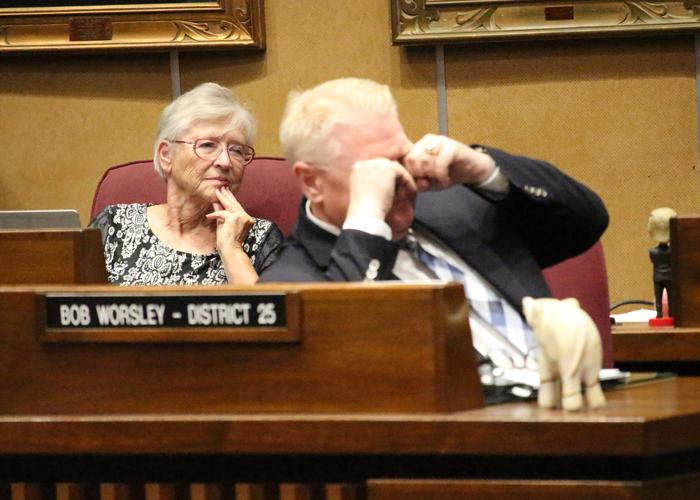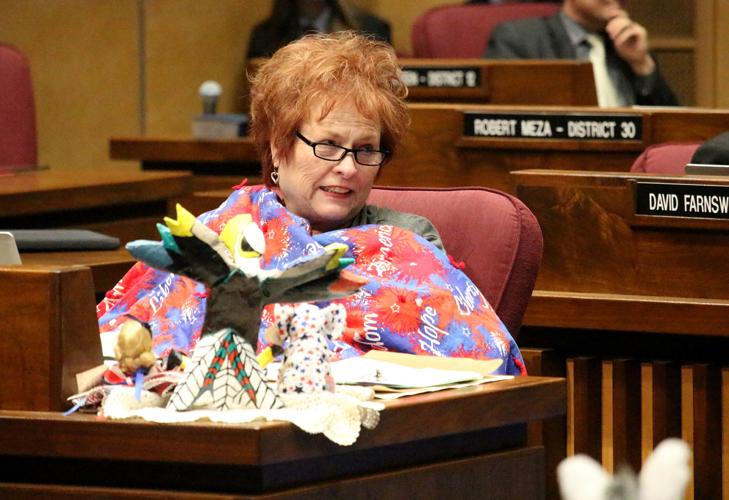PHOENIX — If the just-completed legislative session were a school year, the Class of 2018 would not be making the Honor Roll.
Oh, sure, there were a few outstanding successes, like coming up with a comprehensive plan to deal with opioid abuse from all angles. And even the vote to give teachers a 19 percent pay hike probably rates an “A,” even though educators wanted far more, like restoring state aid to at least 2008 levels.
There also were some “B”s for dealing with problems, like having the state license sober-living homes for the first time ever and removing Arizona from the list of states where there was no minimum age to get married.
But much of the 116-day session resulted in what could be described as just average, run-of-the-mill alterations to existing state law, much of it to satisfy one or another business interest.
And there were more than a fair share of “F”s — and incompletes in particular — for things left undone, particularly anything dealing with gun violence and school safety.
Still, there were examples of being able to work and play well together, notably the package of changes designed to deal with the spike of opioid-related deaths.
Coordinating with members of both parties and affected interests, Gov. Doug Ducey put together a plan that does everything from limiting the number of pills that patients can get at any one time and the strength of their dosages to training for doctors to a “Good Samaritan” provision allowing people to call for help when a buddy overdoses without fearing they will get arrested themselves.
Still, even that had to be picked apart, with lawmakers rejecting some ideas like a “needle exchange” program to ensure that users aren’t sharing disease as they share needles.
Ducey and the Republican legislative leadership did focus on K-12 funding, not only with the pay hike but also a move to start restoring $371 million in other annual school district assistance that they had taken away in prior years.
There also was a decision to extend the 0.6 of-a-cent sales tax for education that was set to expire in 2021. Still, it did take a bit of prodding from a newly energized group of teachers to get their attention.
Lawmakers also agreed to require recess periods for children in kindergarten through fifth grade. They also spelled out that schools that offer kindergarten incorporate play as an instructional strategy and be “academically meaningful.”
School districts are now barred from refusing to sell unused buildings to charter schools.
Substitute teachers can now use some of their time in front of a classroom toward the experience requirement to get a teaching certificate.
And schools are now free to put up the state motto of “Ditat Deus” including its translation of “God enriches.”
Then there’s the list of what did not get done.
The most spectacular — and perhaps most far-reaching — failure was the inability to enact any changes in laws designed to deal with gun violence, particularly at schools.
While there has been no shortage of mass shootings, the killing of 17 students and teachers at a Parkland, Florid, high school appeared to put some momentum into the movement to address the issue, both nationally and in Arizona. Even Ducey came up with a plan.
But the governor found few friends, with some noting his refusal to propose universal background checks on gun sales and a ban on “bump stocks.” Others criticized the idea of allowing a judge to order someone locked up for evaluation to determine if that person is such a potential danger to self or others that the ability to have a firearm should be curbed.
Lawmakers also refused to enact stiffer penalties for the intentional abuse or killing of pets, even after being told that those who commit those crimes often go on to become mass shooters.
Close behind is the failure to make meaningful — and some say needed — changes in state water laws.
Arizona does have what some consider to be a fairly effective code for dealing with groundwater.
But an ongoing drought has pointed out the flaws and the gaps in the statute, things like property owners in rural areas being able to pump all they want without measuring it. There also are questions about how existing laws work when they deal with surface waters, which are handled differently in statutes, even though taking water from one tends to affect the other.
But the big hangup was what amounted to a turf war about Colorado River water with Ducey and his Department of Water Resources on one side and the Central Arizona Water Conservation District with its own elected board on the other.
Also failing was a bid to allow counties to impose their own gasoline taxes to meet road-construction and -maintenance needs.
A bid to provide tax relief to senior homeowners also failed, as did a ban on photo radar.
And Arizona will not be joining 47 other states that have some sort of a ban on driving while texting. While a measure cleared the Senate, it was blocked when House Speaker J.D. Mesnard, R-Chandler, said the only thing acceptable to him would be a law on “distracted driving.”
Lawmakers did spend some of their time telling other levels of government how to operate.
Most significant is a law that prohibits cities and counties from enacting ordinances that require nonprofit groups to disclose the source of their dollars when they get involved in affecting elections. But the Legislature also decided to restrict the ability of cities to set their own election dates if they can’t show that it does not depress turnout.
Lawmakers also inserted themselves into some personal areas, spelling out a list of questions that have to be asked of a woman before she can get an abortion and deciding that when there are frozen embryos after a divorce, the parent willing to bring them to term gets preference.
They were willing to alter state laws in the name of promoting business — sometimes specific interests.
Consider the measure to allow Grade A eggs to remain on store shelves longer. That was pushed by a Arizona Retailers Association concern that consumers were loath to buy eggs that were close to their 24-day pull date, resulting in lots of unused — and unusable — product.
Trust companies can now meet their legal capital requirements with gold coins.
Sand-and-gravel companies pushed through a measure allowing them to get variances from requirements to reclaim the land where they mine their products.
Landlords are getting more flexibility in how they handle personal property left behind by tenants.
Companies that sell service contracts on things like appliances are becoming exempt from the same requirements as other forms of insurance.
Grocers are being spared the possibility that a community might impose a sales tax on sugared sodas.
And lawmakers voted to set up a “regulatory sandbox” program where companies can try out “innovative” financial products on Arizonans without having to be licensed or get other regulatory authority.
Republican lawmakers did agree to ask voters in November to impose some new limits on the Citizens Clean Election Commission, which administers funds to statewide and legislative candidates who forego private donations.
But they opted not to put a “clean energy” measure on the ballot crafted by Arizona Public Service to compete with a more-comprehensive initiative by a California billionaire. Also failing to be referred to the ballot was an effort to undermine a part of the 2016 voter-approved minimum -wage law, which gives workers guaranteed sick days, and another measure to revamp the Independent Redistricting Commission.
Some of what happened had little to do directly with legislation.
There was the decision by the House to eject one of its own after several lawmakers, lobbyists, staffers and even a newspaper publisher complained that Rep. Don Shooter, R-Yuma, had sexually harassed them.
And the whole attitude of less regulation allowed Ducey to unilaterally decide that testing autonomous vehicles on Arizona roads was just fine — until the governor had to reverse course after a pedestrian was killed in Tempe.





